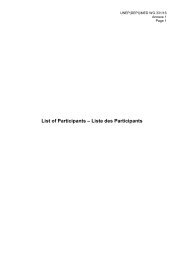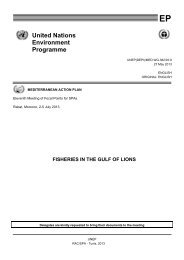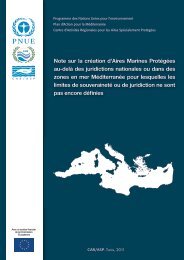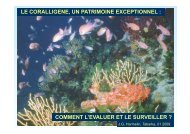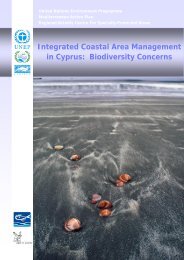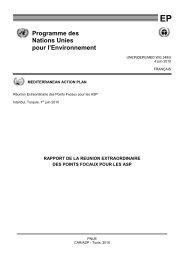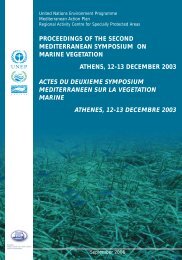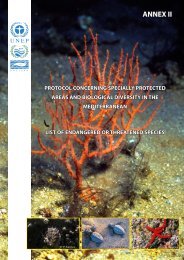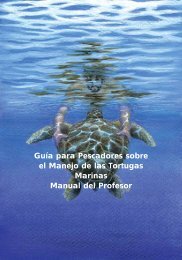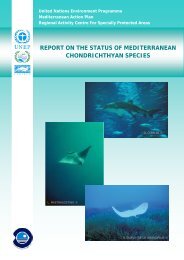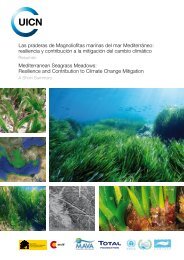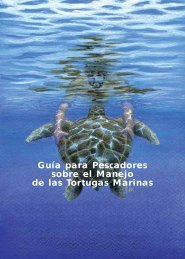Plan d'Action pour la conservation des espèces d'oiseaux inscrites ...
Plan d'Action pour la conservation des espèces d'oiseaux inscrites ...
Plan d'Action pour la conservation des espèces d'oiseaux inscrites ...
You also want an ePaper? Increase the reach of your titles
YUMPU automatically turns print PDFs into web optimized ePapers that Google loves.
Cory’s Shearwater<br />
Calonectris diomedea<br />
Current status<br />
The nominate subspecies Calonectris d. diomedea is restricted to<br />
the Mediterranean. It breeds in sea-cliffs, and on rocky is<strong>la</strong>nds<br />
and islets. The popu<strong>la</strong>tion has been estimated at less than 76,000<br />
pairs, but surveys in the eastern part of the Mediterranean and in<br />
the Adriatic are <strong>la</strong>cking. There has been a considerable decline<br />
of the species throughout the Mediterranean.<br />
Current factors causing loss or decline<br />
Introduced mammals, such as Rattus sp., which affect breeding<br />
success; illegal hunting; taking of eggs and/or chicks; mortality from<br />
bycatch (longlines), development close to colonies and<br />
disturbance, and possibly oil spills and chemical pollution of the sea.<br />
Status under international instruments<br />
Annex I - European Union Directive on the Conservation of Wild<br />
Birds (79/409/EEC/1979). European Union Regu<strong>la</strong>tion <strong>la</strong>ying down<br />
certain technical measures for the <strong>conservation</strong> of fishery<br />
resources in the Mediterranean (1626/94 (EC) 1994).<br />
Current Action <strong>P<strong>la</strong>n</strong>s<br />
None<br />
Action <strong>P<strong>la</strong>n</strong> objectives and target<br />
To halt the decline of the popu<strong>la</strong>tion and maintain healthy colonies.<br />
Proposed action<br />
- Inventory and map critical habitats supporting the colonies,<br />
particu<strong>la</strong>rly in the eastern part of the Mediterranean. Confer<br />
strictly protected status on the species.<br />
- Prohibit all types of disturbance to breeding colonies, including<br />
the taking of eggs and young.<br />
- Monitor and warden colonies under threat of disturbance.<br />
- Create SPAs where breeding colonies exist.<br />
- <strong>P<strong>la</strong>n</strong>, regu<strong>la</strong>te and/or manage activities and processes of<br />
coastal and infrastructure development near to known colonies.<br />
- Prevent oil spills and chemical pollution of the sea.<br />
- Monitor levels of mercury and chlorinated hydrocarbons in<br />
popu<strong>la</strong>tions.<br />
- Develop and implement management projects targeting the<br />
<strong>conservation</strong> of the breeding habitat and strict control of<br />
introduced mammals, as well as preventing the introduction of<br />
alien predatory species.<br />
- Identify important bird areas at sea for the species.<br />
- Develop an Action <strong>P<strong>la</strong>n</strong> to reduce mortality at sea especially<br />
from by-catch.<br />
18<br />
© H. AZAFZAF<br />
«Shearwaters are ocean<br />
birds, well adapted to<br />
constant flight over the<br />
high seas, but poorly<br />
equipped for walking on<br />
<strong>la</strong>nd, as their feet are set<br />
so far back on their<br />
bodies.»



